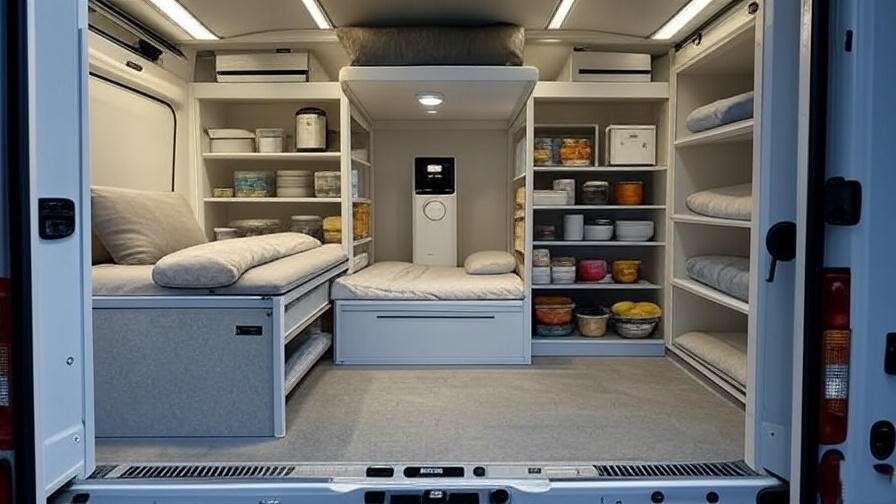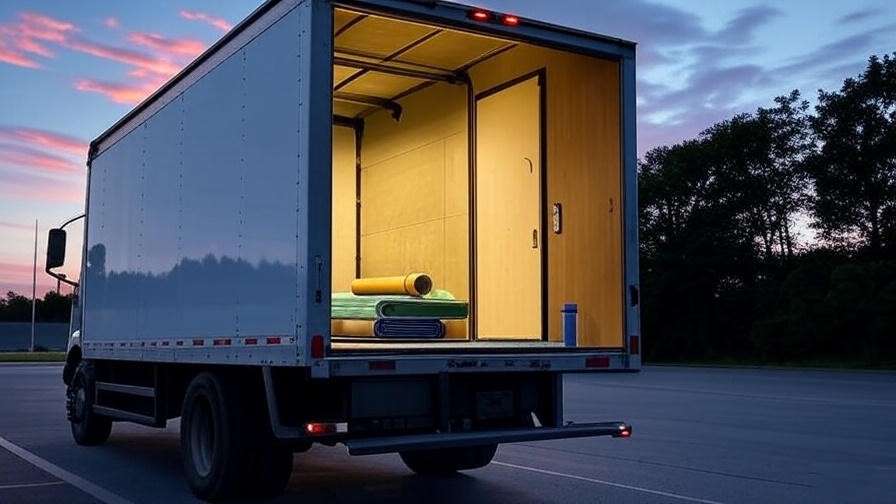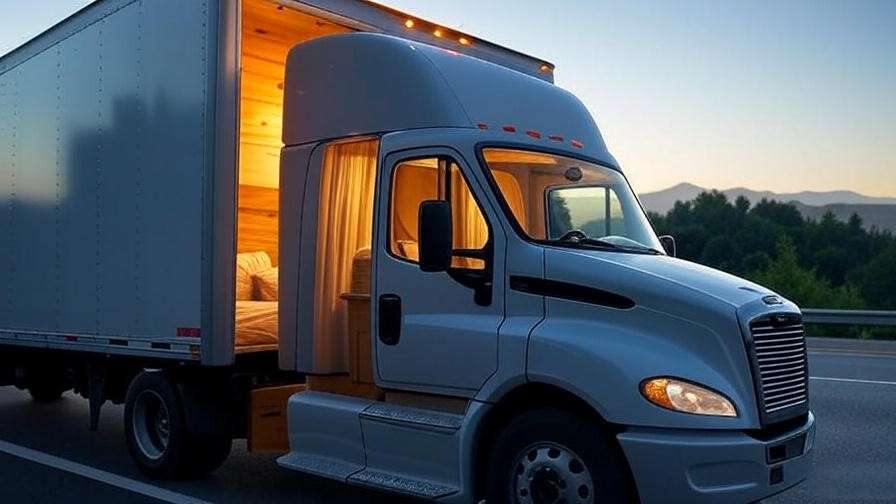Picture this: you’re cruising down a quiet highway, the open road stretching endlessly before you, knowing that a cozy, restful sleep awaits in your own mobile haven. For digital nomads, long-haul truckers, and adventure enthusiasts, a box truck with a sleeper for sale offers the perfect blend of freedom, functionality, and wellness. These versatile vehicles are more than just transportation—they’re a lifestyle choice that prioritizes comfort and holistic well-being. Whether you’re delivering goods across state lines or exploring the country as a nomad, a box truck with a sleeper ensures you stay rested, focused, and ready for the journey ahead. In this comprehensive guide, we’ll explore why these trucks are a game-changer, what to look for when buying, and how to transform your vehicle into a sanctuary for restful road trips. Backed by sleep science, expert insights, and real-world stories, this article will empower you to make an informed decision and hit the road with confidence.
Why Choose a Box Truck with a Sleeper?
The Rise of Mobile Living and Work
The nomadic lifestyle is booming. From van lifers to remote workers and over-the-road truckers, more people are embracing the freedom of mobile living. According to a 2024 report by the RV Industry Association, the demand for customizable vehicles like box trucks has surged by 22% in the past three years, driven by those seeking flexibility and self-sufficiency. A box truck with a sleeper compartment stands out as a practical solution, offering ample space for both work and rest. Unlike traditional RVs, these trucks are built for durability and can be tailored to suit a range of needs, from mobile offices to adventure bases, all while ensuring you get quality sleep on the go.
Benefits for Sleep and Holistic Well-Being
Sleep is the cornerstone of health, mood, and productivity, especially for those spending long hours on the road. The National Sleep Foundation notes that adults need 7-9 hours of quality sleep per night to maintain cognitive function and emotional balance. For truckers and nomads, poor sleep can lead to fatigue, reduced focus, and even safety risks. A sleeper-equipped box truck addresses these challenges by providing a dedicated space for rest, designed to promote relaxation and recovery. By prioritizing sleep hygiene, you can enhance your mental clarity, reduce stress, and maintain holistic well-being, making every journey more enjoyable and productive.
Versatility of Box Trucks with Sleepers
Box trucks with sleepers are incredibly versatile, catering to a wide range of lifestyles. Long-haul truckers rely on them for comfortable rest between deliveries, while digital nomads use them as mobile homes and workspaces. Adventure seekers appreciate their ability to access remote destinations without sacrificing comfort. Compared to RVs, box trucks are often more affordable and easier to maintain, with larger cargo areas that allow for custom conversions. Whether you’re hauling freight, running a mobile business, or embarking on a cross-country adventure, a sleeper truck offers unmatched flexibility and practicality.
Key Features to Look for in a Box Truck with Sleeper
Sleeper Compartment Essentials

The heart of a box truck with a sleeper is its rest area. A well-designed sleeper compartment should prioritize comfort and functionality. Look for a spacious bed (at least a twin or full-size mattress) with a high-quality, supportive mattress—memory foam or hybrid options are ideal for reducing pressure points. Proper insulation is critical to maintain a comfortable temperature, especially in extreme climates. Ventilation is equally important; ensure the sleeper has windows or vents to promote airflow and prevent stuffiness. According to sleep expert Dr. Sarah Thompson, “A well-ventilated sleep environment can improve sleep quality by up to 20%, reducing nighttime disruptions.”
Vehicle Specifications
Beyond the sleeper, the truck’s core specifications matter. Opt for a reliable engine—diesel models like the Cummins or Duramax are known for longevity and fuel efficiency. Payload capacity is another key factor; a truck with a gross vehicle weight rating (GVWR) of 26,000 pounds or less typically doesn’t require a commercial driver’s license (CDL), making it accessible for non-professional drivers. Check the chassis for durability, especially if you plan to carry heavy loads or customize the interior. Fuel efficiency is also critical for long-term savings, with modern box trucks averaging 8-12 miles per gallon depending on load and driving conditions.
Comfort and Convenience Add-Ons

To elevate your road trip experience, look for comfort-focused features. Climate control (air conditioning and heating) ensures a consistent temperature, while soundproofing minimizes road noise for uninterrupted sleep. Adequate storage is essential for keeping your living space organized, and LED lighting with dimming options can create a calming ambiance. For wellness-focused travelers, consider add-ons like air purifiers to maintain clean air or blackout curtains to block external light, both of which enhance sleep quality. These features transform your truck into a mobile oasis tailored to your needs.
Customization Potential
One of the biggest advantages of a box truck is its customization potential. Unlike pre-built RVs, box trucks offer a blank canvas for creating a space that reflects your lifestyle. For example, you could add a compact kitchen for healthy meals, a meditation nook for mindfulness practices, or even a foldable desk for remote work. Wellness-focused conversions might include calming color schemes, natural wood finishes, or space for yoga mats. Conversion specialist Emily Carter, who has built over 50 custom sleeper trucks, advises, “Prioritize multi-functional furniture and layouts that maximize space without compromising comfort.”
Where to Find a Box Truck with Sleeper for Sale
Online Marketplaces and Dealerships
Finding a box truck with a sleeper for sale is easier than ever thanks to online platforms. Websites like Commercial Truck Trader, eBay Motors, and TruckPaper offer extensive listings for both new and used models. Local dealerships specializing in commercial vehicles are another reliable option, often providing financing and warranties. To avoid scams, verify the seller’s reputation through reviews and ratings, and request detailed vehicle history reports. For example, Carfax or AutoCheck can reveal past accidents or maintenance issues, ensuring you invest in a trustworthy vehicle.
Auctions and Fleet Sales
For budget-conscious buyers, auctions and fleet sales are excellent sources for used box trucks. Companies like Ritchie Bros. Auctioneers and Penske Used Trucks frequently sell well-maintained fleet vehicles at competitive prices. While these trucks may require minor repairs or conversions, they often come with detailed service records, adding to their reliability. Be prepared to act quickly, as auctions move fast, and bring a mechanic to inspect the vehicle if possible. Weigh the savings against potential repair costs to determine if a used truck aligns with your budget and needs.
Custom Conversion Companies
If you prefer a turnkey solution, custom conversion companies can build a sleeper-equipped box truck to your specifications. Firms like Sportsmobile, VanCraft, and Boho Camper Vans specialize in transforming box trucks into comfortable, functional living spaces. These companies often incorporate wellness-focused features like ergonomic beds, solar power, and water filtration systems. While custom conversions are pricier—ranging from $20,000 to $100,000 depending on complexity—they save time and ensure professional craftsmanship. Always request a portfolio of past projects to assess the company’s expertise.
Buying Guide: How to Choose the Right Box Truck with Sleeper
Assessing Your Needs
Before purchasing a box truck with a sleeper, clarify your specific needs to ensure the vehicle aligns with your lifestyle and wellness goals. Ask yourself: How often will you travel? Are you a long-haul trucker needing a reliable workhorse, a digital nomad seeking a mobile home, or an adventure enthusiast exploring remote destinations? Consider your space requirements—do you need room for work equipment, recreational gear, or wellness-focused amenities like a meditation corner? Create a checklist of must-haves, such as bed size, storage capacity, and power sources (e.g., solar panels for off-grid living). Aligning the truck’s features with your goals ensures it supports both practical needs and holistic well-being.
Budget Considerations
Budget is a critical factor when shopping for a box truck with a sleeper. New models typically range from $50,000 to $100,000, while used trucks can be found for $20,000 to $60,000, depending on condition and features. Additional costs include conversions (if not pre-installed), maintenance, insurance, and fuel. Financing options, such as loans from credit unions or dealerships, can make purchasing more manageable—look for terms with low interest rates and flexible repayment periods. To save money, consider buying a used truck from a reputable fleet sale and allocating funds for custom upgrades. Always factor in long-term costs, like routine maintenance and potential repairs, to avoid financial strain.
Inspecting a Box Truck
A thorough inspection is essential to ensure your box truck is roadworthy and comfortable. Start with the engine: check for leaks, unusual noises, or excessive wear, and review maintenance records for regular servicing. Test the sleeper compartment for comfort—lie on the bed to assess mattress quality and ensure adequate headroom and ventilation. Examine the chassis and suspension for signs of rust or damage, especially if you plan to carry heavy loads. For used trucks, hire a certified mechanic to perform a detailed inspection, focusing on critical systems like brakes, transmission, and electrical components. Request a test drive to evaluate handling and noise levels, which can impact sleep quality.
Legal and Regulatory Factors
Navigating legal requirements is crucial when purchasing a box truck. Most box trucks with a GVWR under 26,000 pounds don’t require a CDL, making them accessible for personal use. However, check state-specific regulations, as some areas impose restrictions on vehicle weight or modifications. If you’re using the truck commercially, comply with Department of Transportation (DOT) regulations, including driver logs and safety inspections. Ensure the sleeper compartment meets safety standards, such as secure mounting and fire-resistant materials. Consulting a transportation attorney or local DMV can clarify licensing and registration requirements, ensuring your truck is road-legal and safe.
Enhancing Sleep and Well-Being in Your Box Truck
Optimizing the Sleeper for Rest

Quality sleep is non-negotiable for road warriors, and optimizing your sleeper compartment is key. Invest in a high-quality mattress—memory foam or hybrid models provide excellent support and reduce motion transfer from road vibrations. Maintain an ideal sleep temperature (60-67°F, per sleep research) with proper insulation and a portable heater or air conditioner. Reduce noise with soundproofing materials like mass-loaded vinyl or acoustic foam; a white noise machine can further mask external sounds. Blackout curtains or shades are essential for blocking light, especially during daytime naps. Dr. Michael Chen, a sleep scientist, notes, “Consistent sleep conditions, even in a mobile environment, can improve REM sleep by 15-20%.”
Creating a Calming Environment
A restful environment goes beyond the bed. Use calming colors like soft blues or greens for interior decor, as these hues promote relaxation, according to color psychology studies. Install dimmable LED lighting to create a soothing ambiance for winding down. Incorporate natural textures, such as wood paneling or cotton bedding, to evoke a sense of calm. For mindfulness practices, dedicate a small corner for meditation or journaling—foldable cushions or a compact stool can maximize space. Aromatherapy diffusers with lavender or chamomile scents can further enhance relaxation, making your sleeper a true wellness retreat.
Practical Wellness Modifications
Transform your box truck into a holistic haven with thoughtful modifications. Install a compact water filtration system to ensure clean drinking water, supporting hydration and health. A small exercise area with resistance bands or a foldable yoga mat encourages physical activity, which boosts mood and sleep quality. Consider solar panels for sustainable power, allowing you to run wellness devices like air purifiers or electric kettles for herbal teas. For mental well-being, create a “zen zone” with a portable speaker for guided meditations or calming music. These upgrades ensure your truck supports both physical and emotional health on the road.
Real-Life Stories: Success on the Road
Case Study 1: The Digital Nomad

Meet Sarah, a 32-year-old graphic designer who traded her apartment for a custom box truck with a sleeper. Equipped with a foldable desk, solar power, and a memory foam bed, her truck doubles as a mobile office and home. “The sleeper is my sanctuary,” Sarah says. “After a long day of work, I meditate in my cozy nook and sleep better than I ever did in the city.” Her setup includes blackout curtains and an air purifier, ensuring restful sleep even in busy truck stops. Sarah’s story highlights how a sleeper truck can support productivity and well-being for remote workers.
Case Study 2: The Long-Haul Trucker
John, a 45-year-old long-haul trucker, upgraded to a box truck with a sleeper to combat fatigue. His previous rig lacked a comfortable bed, leaving him exhausted after long drives. With his new truck’s ergonomic mattress and soundproofed sleeper, John reports a 30% improvement in energy levels. “I used to dread overnight stops,” he shares. “Now, I wake up refreshed and ready to roll.” His truck also features a compact fridge for healthy meals, aligning with his goal of maintaining physical health. John’s experience underscores the value of a well-designed sleeper for professional drivers.
Lessons Learned from Nomads
Real-world nomads offer valuable insights. Common tips include investing in quality insulation to regulate temperature, prioritizing multi-functional furniture to save space, and testing the sleeper layout before committing to a design. Mistakes to avoid? Skimping on mattress quality, neglecting ventilation, or overloading the truck beyond its capacity. These lessons, drawn from dozens of nomad blogs and forums, emphasize the importance of planning and prioritizing comfort for long-term success.
Maintenance and Long-Term Care
Keeping Your Truck Road-Ready

Regular maintenance ensures your box truck remains reliable. Follow a schedule: check oil every 3,000-5,000 miles, inspect tires monthly for wear, and service brakes annually. Monitor the cooling system and battery, especially for long trips in extreme weather. DIY tasks like fluid checks or tire rotations can save money, but entrust major repairs to certified mechanics. Keep a log of all maintenance to track the truck’s health and retain resale value. A well-maintained truck not only performs better but also ensures safe, stress-free travel.
Preserving the Sleeper’s Comfort
The sleeper compartment requires ongoing care to maintain its restful environment. Clean the mattress monthly with a vacuum and mild detergent to prevent dust buildup. Wash bedding weekly to ensure hygiene, and use mattress protectors to extend its lifespan. Check ventilation systems for blockages, and replace air purifier filters as recommended. Inspect insulation and seals for wear, especially after heavy rain or temperature swings, to prevent leaks or drafts. These simple routines keep your sleeper cozy and conducive to quality rest.
FAQs About Box Trucks with Sleepers
What’s the Average Cost of a Box Truck with a Sleeper?
Prices vary based on condition, features, and customization. New trucks range from $50,000 to $100,000, while used models start at $20,000. Custom conversions add $10,000-$50,000, depending on complexity.
Can I Convert a Regular Box Truck into One with a Sleeper?
Yes, conversions are common. DIY projects cost $5,000-$20,000, while professional conversions range from $20,000-$100,000. Ensure proper insulation, ventilation, and a sturdy bed frame for comfort.
Are Box Trucks with Sleepers Suitable for Full-Time Living?
Absolutely, with proper modifications. Full-time nomads benefit from added storage, power systems, and compact amenities like kitchens or bathrooms. Plan for space constraints and regular maintenance.
How Do I Ensure Good Sleep in a Box Truck?
Use a quality mattress, blackout curtains, and soundproofing. Maintain a cool, well-ventilated environment and practice sleep hygiene, like avoiding screens before bed.
Conclusion
A box truck with a sleeper for sale is more than a vehicle—it’s a gateway to restful, wellness-focused road trips. Whether you’re a trucker, nomad, or adventurer, these trucks offer the perfect blend of practicality and comfort, ensuring you stay rested and rejuvenated on the road. By choosing the right features, inspecting carefully, and customizing for well-being, you can create a mobile sanctuary that supports your lifestyle. Explore trusted marketplaces, consult conversion experts, or start planning your dream setup today. With the insights and tips in this guide, you’re ready to hit the road with confidence and embrace the freedom of restful travel.













